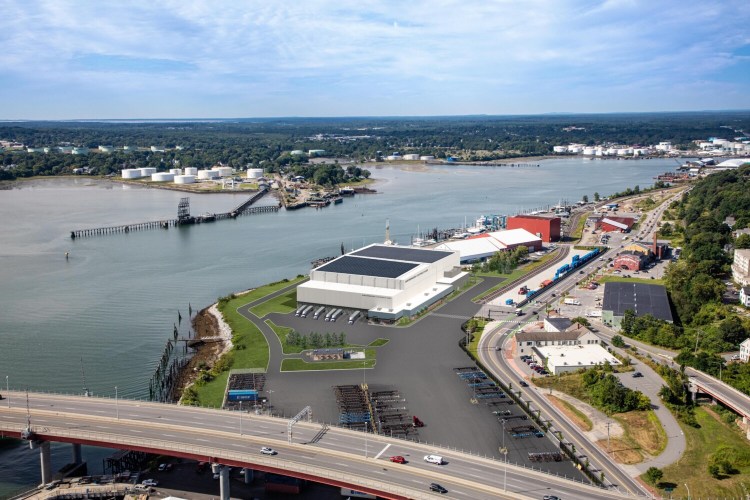The most recently approved developers of a cold storage building on Portland’s working waterfront say they hope to begin construction of the $40 million facility this fall.
George Campbell, a principal with Yarmouth-based Treadwell Franklin Infrastructure, said the company has continued planning for the project through the pandemic, but the price of raw materials has increased and pushed up the cost, which had been originally projected to be $30 million.
The 120,000-square-foot facility will be located on state-owned land next to the International Marine Terminal on the Fore River. Portland’s West End neighborhood overlooks the proposed project site.
State port officials have been strong supporters of the project, which is expected to accommodate up to 20,000 pallets of refrigerated goods, saying it could spur further development of shipping in Portland. Currently, frozen and refrigerated shipments have to be taken to Boston for storage and then brought back to Maine for local distribution.
The Maine Port Authority has been pushing the project, saying it will turn the city’s port into a hub for shipments of frozen food. The site will be leased from the state for up to 50 years.
West End residents have opposed the project, arguing it is too large and does not belong on the waterfront. More than 80 residents signed a letter of opposition, which they presented to the city in August 2020. They’ve expressed concerns about increased traffic on one of Portland’s most congested streets, the scale of the facility, and increased noise caused by truck traffic.
The building is expected to meet the refrigerated cargo demands of shipping company Eimskip USA and be big enough to accommodate customers from Maine’s growing food, beverage and biopharmaceutical industries. Freight volume on Portland’s waterfront grew by an average of 25 percent annually over the seven years ending in 2020 after Eimskip made Portland its North American headquarters in 2013. In 2019, more than 28,600 container units passed through Portland, about quadruple the volume in 2013.
The Commercial Street site has been mostly vacant since Atlanta-based Americold Realty Trust abandoned its plans in 2018 to build a similar cold storage facility on Commercial Street.
Americold, the world’s largest temperature-controlled warehouse owner, was selected in 2015 to build and operate a facility on state-owned land next to the International Marine Terminal. Those plans never materialized, even after a lengthy public process to amend the zoning around the construction site so Americold could build a nearly 70-foot-tall warehouse. The estimated cost of that project was $30 million, plus another $5 million to $6 million to stabilize the loose, muddy soil at the site to support the massive building.
Campbell said the potential to make the port a bigger draw for shippers is a key driver behind the project.
“We continue to have a lot of confidence in this project … to serve the port and the shipping industry and Maine businesses,” he said.
Campbell said the developers have not completed the design of the building because they are still examining the waterfront site, which was polluted by previous uses. It has been abandoned in recent years and its last use was for natural gas and propane distribution.
The state, which currently owns the land, has to deliver a buildable site to the developers and has put about $7 million into preparing it for the project, Campbell said.
Other companies involved in the project include Eimskip, Amber Infrastructure of the United Kingdom, and Woodard & Curran, a Portland engineering firm.
The Portland Planning Board approved the project last fall despite opposition from some residents.
Campbell said the pandemic didn’t slow work on the project but it did highlight the importance of cold storage as a key part of U.S. supply chains.
Send questions/comments to the editors.




Comments are no longer available on this story